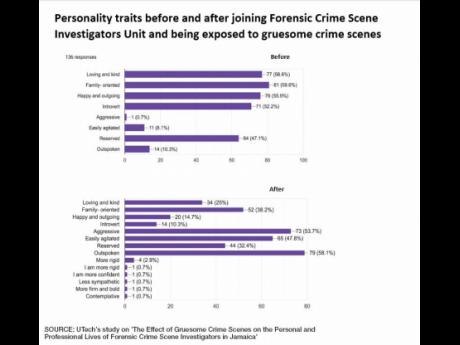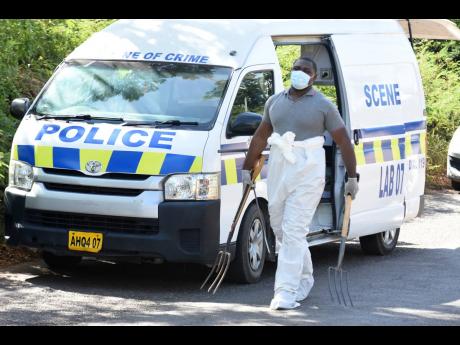Trapped in silence
- Gruesome crime scenes taking mental toll on police investigators - Many suffer in secret out of fear, with detrimental implications, new study reveals
A high percentage of the police force’s crime scene investigators are experiencing serious mental health challenges due to repeated exposure to gruesome crime scenes and stomach-churning autopsies, a recent study has revealed. Even more concerning...
A high percentage of the police force’s crime scene investigators are experiencing serious mental health challenges due to repeated exposure to gruesome crime scenes and stomach-churning autopsies, a recent study has revealed.
Even more concerning, some are like a powder keg ready to explode, because they are not getting much-needed help and instead are suffering in silence due to the perceived stigma and discrimination associated with mental illness in a working environment where they are required to be strong – mentally and physically, researchers from the University of Technology (UTech) have found.
In the research document, titled ‘The Effect of Gruesome Crime Scenes on the Personal and Professional Lives of Forensic Crime Scene Investigators in Jamaica’, the study authors noted that repeated interactions with crime scenes not only catalysed depression and other forms of mental illnesses in the investigators, but mixed with hopelessness and frustration with working conditions in the Jamaica Constabulary Force (JCF), it is negatively impacting their family and professional life.
“After repeated exposure to GCS (gruesome crime scenes), Jamaican Forensic Crime Scene Investigators (FCSI) exhibited diminished interpersonal relationships in their personal and professional lives,” underscored the probe.
Researchers Dr Delton Gordon, a retired policeman, and head of the forensic division and lecturer at UTech; and Andrea Fender-Longman, senior lecturer in the Biology Division, also at the UTech, conducted the study, which will be featured in an academic journal this year.
Although other categories of first responders face similar challenges, the researchers pinpointed crime scene investigators among the hardest hit by the country’s wanton crime woes.
Jamaica is ranked among the top 10 countries with the highest crime rate of more than 60 per 100,000 persons.
There are 13 Scene of Crime offices islandwide with roughly 130 FCSI with a responsibility to process more than 3,000 scenes annually. They face endless horror that is seared into their brain, leading to nightmares for many, the study noted.
STUDY FINDINGS
‘The Effect of Gruesome Crime Scenes on the Personal and Professional Lives of Forensic Crime Scene Investigators in Jamaica’ study featured 100 male and 36 female participants, most of whom were in their early 30s, and had been with the FCSI unit for six to ten years. Six persons actively served for 16 years.
Forty-four of the respondents had examined less than 100 crime scenes, while 52 processed less than 300; and 34 processed less than 1,000. Six of the policemen who participated had worked on more than 1,000 crime scenes in Jamaica. Nine supervisors of FCSIs were also interviewed as part of the qualitative and quantitative analysis that began in 2020.
Among the findings it was revealed that, before exposure to gruesome crime scenes, 56.6 per cent of the respondents said they were loving and kind; 55.9 per cent reported being happy and outgoing; 52.2 per cent were introverted; 0.7 per cent were aggressive; 8.1 per cent were easily agitated; and 10.3 per cent said they were outspoken.
In contrast, after repeated exposure to gruesome crime scenes, the figures changed significantly. The authors said 25 per cent reported being loving and kind; 14.7 per cent were happy and outgoing; 10.3 per cent were introverted; 53.7 per cent had become aggressive; 47.8 per cent were now easily agitated and 58.1 per cent had become outspoken.
“Based on these results, periodic evaluation and interventions are necessary to promote healthy forensic crime scene investigators,” cautioned the paper.
“Given that Post-Traumatic Stress Disorder symptoms may contribute to adjustment problems in social, family and work settings, early screening is vital.”
‘I HAVE TO MENTALLY PREPARE MYSELF’
Several policemen who The Sunday Gleaner spoke to last week all supported the findings of the study.
In addition to the gruesome murder scenes and constant anxiety over personal safety on the nation’s roads, the policemen also cited poor working conditions, remuneration, and victimisation among the common issues affecting their mental health and that of their colleagues.
But many are afraid to even admit that they have mental health challenges, much less to seek help, they say.
“I have to mentally prepare myself for it to not affect me negatively because there is hardly any positive,” said a member of the FCSI unit who has been on the job for 13 years.
“From the very onset, I have to tell myself that this is a job and if I’m not doing it somebody else is going to have to do it, who would be suffering the same fate that I am,” he said, explaining his task of reconstructing crimes using scientific evidence gathered from corpses and crime scene surroundings.
Even though exposure and time build tolerance, one can never be truly prepared for some crime scenes, he said, adding that seeking help for mental health disorders could mean being ridiculed by peers.
“I was on a crime scene with my colleague and when we started our walk through we discovered that 26 shots had been fired and the victim was hit by all of them,” he recalled.
“When my colleague approached the deceased, he shouted ‘Wait, is not Wayne that!?’ By the time we could ask if he knew the victim, he just collapsed. I had to catch him and hold him up so that he didn’t fall on the dead man.”
The deceased was a former policeman who had gone through training school and served in the force with his colleague, the FCSI explained. The victim was ambushed and killed while returning home.
His colleague took it very hard, he said.
“That incident continues to affect me. Every time I reach home and am about to set foot in my house, I open the grille back ways because I am still traumatised by that incident. I cannot enter the house straight,” he said.
“If someone inside even comes and opens the grille for me, I still enter the house sideways, alert.”
The father also reflected on a gruesome arson attack that claimed the lives of four persons, including a four-year-old, two weeks ago in Central Village, St Catherine. “And I’ve seen much worse, but you are torturing me if you ask me to talk about those,” he said.
One constable shared with The Sunday Gleaner that his mind still plays back to the final moments of a man’s life he took a few years ago, though he said he had overcome the traumatic event.
The cop, who joined the force in 2018, said although there are health facilities and the JCF’s Chaplaincy Unit that offer support, they are often shunned for fear that members’ medical information may be leaked to their colleagues., which could result in them being ostracised.
UNHEALTHY COPING MECHANISMS
The UTech study also noted that participants shared that they were engaged in unhealthy behaviour, such as smoking, drinking and other forms of substance abuse, to cope with the mental strain of the job.
Dr Kevin Goulbourne, director of Mental Health and Substance Use at the Ministry of Health and Wellness, finds this very concerning. Urging those facing mental health challenges to seek help, he outlined a number of positive coping strategies they can adopt.
These include having a circle of support of close family and friends; developing personal routines; adjusting to changes; developing problem-solving skills; and having reasonable expectations.
Lauding the study, Goulbourne said such works help the public to better understand mental health issues, how they manifest, and how to shun its discrimination.
“Some persons living with mental health disorders have stated that the stigma and discrimination is worse than the disorder itself,” Goulbourne told The Sunday Gleaner, adding that several social and political factors contribute to the discrimination.
He also noted that, “Late detection and treatment of mental illness contribute to poor outcomes, as persons are less likely to recover fully and less likely to complete education, training and maintain gainful employment.”
Affected persons, he said, may be denied education, skills training, job and promotional opportunities that render them increasingly reliant on others to provide basic necessities.
“This results in them being a burden to family, society and having a low quality of life,” Goulbourne said.
JCF’S SUPPORT SYSTEM
Last week, Woman Inspector Pilmore Powell, who recently led a mental illness awareness training course for police officers and other first responders in St Catherine, questioned the presumed prevalence of mental health discrimination within the force.
“The JCF has created the Early Intervention System (EIS), which is a structured approach to, from the early stages, identify and provide intervention for members without attracting criticisms or victimisation,” she said.
“We are guided by diversity, human rights, as well as a police/public interaction policy, to name a few. We are sworn to serve, protect and to reassure, which is first and foremost.”
The Independent Commission of Investigations (INDECOM) could not immediately say whether mental illness concerns were a factor in any of the cases it currently has before the courts involving law enforcement officers. However, representatives pointed to its 2019 ‘Fit for Duty’ report which informs the EIS.
MENTAL HEALTH COPING STRATEGIES
1. Be aware of one’s feelings and take steps to manage negative emotions individually or with the help of trusted relatives, friends, colleagues or mental health professional.
2. Build and maintain relationships with persons who are supportive at all times. Find safe persons to share your concerns, issues, achievements and successes of life.
3. Maintain a routine that involves quiet time, me time, and down time. This includes taking care of yourself (grooming), having a hobby, going to the beach, reading, playing games and sports, meditation and devotion, physical activity, eating regularly, sleeping, and having a pet...whatever you enjoy doing.
4. Use a problem-solving approach towards managing challenges of life rather than spend time ruminating or worrying over problems without seeking to solve them.
5. Accept reality or changes and make the necessary adjustments to deal with them.
6. Pace yourself and have reasonable expectations. If expectations far exceed what you can reasonably achieve, it will give rise to frustration, anxiety, depression, disappointment and a range of mental health disorders.
- SOURCE: Dr Kevin Goulbourne, director of Mental Health and Substance Use at the Ministry of Health and Wellness.




